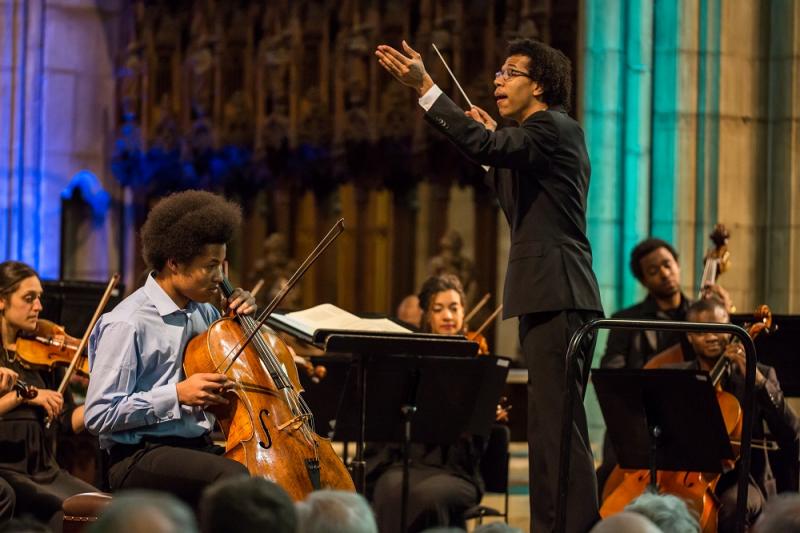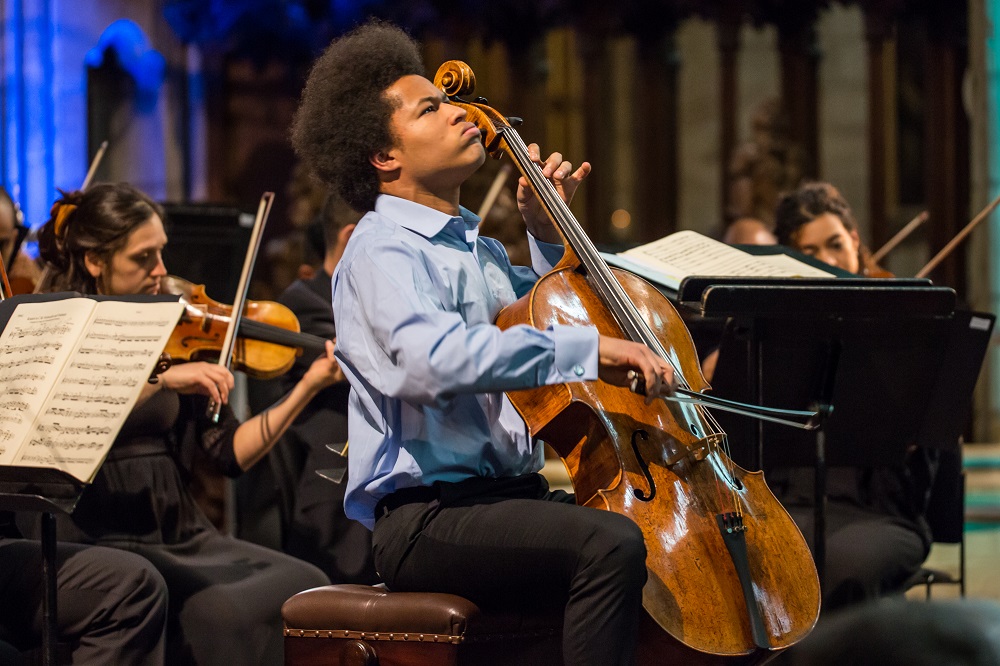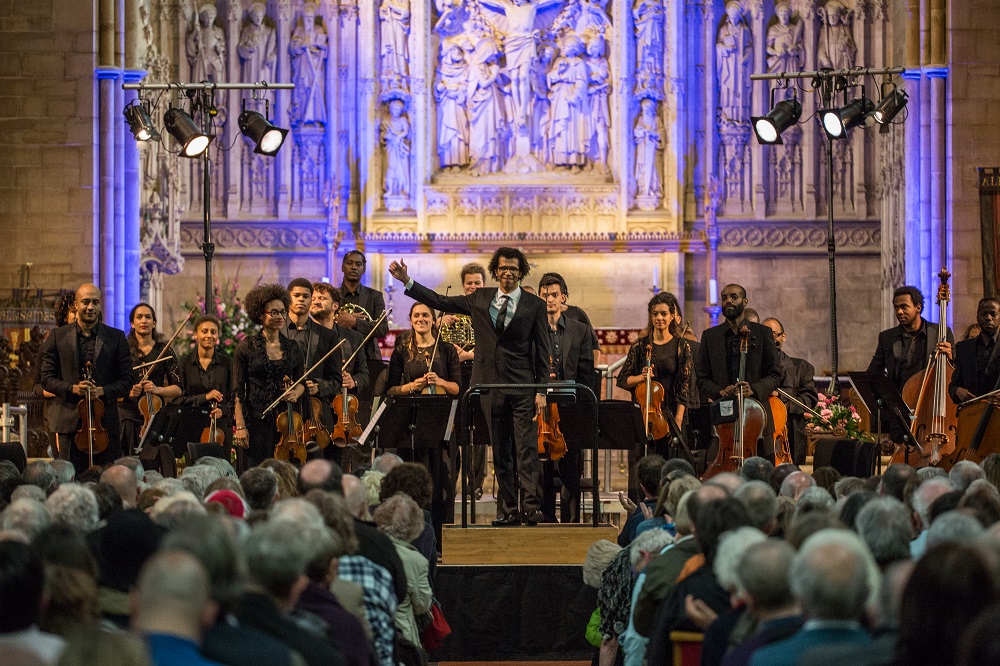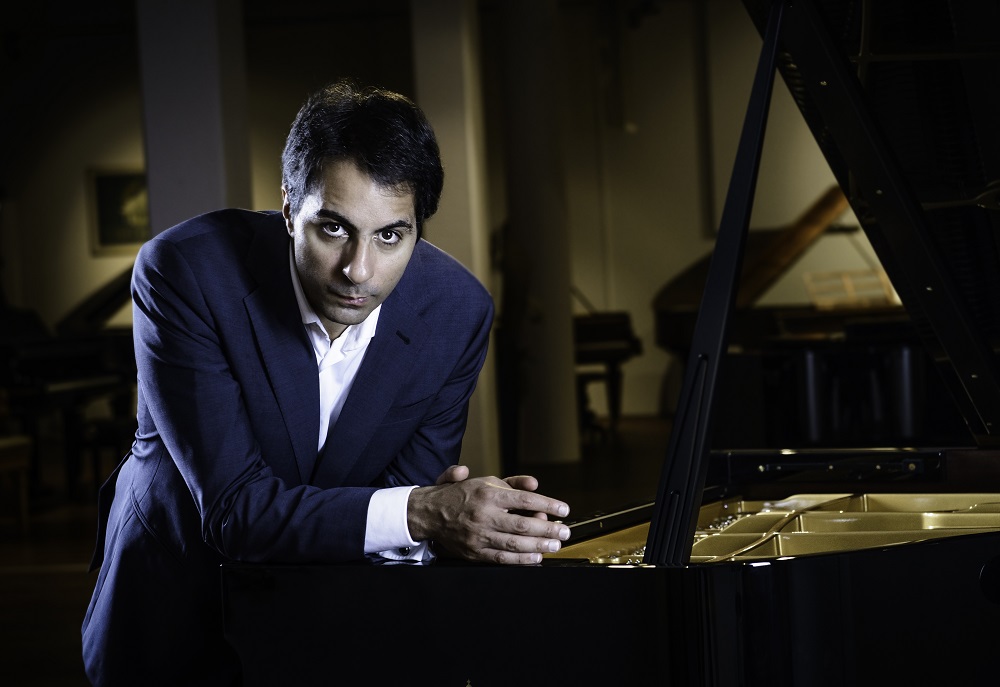Chineke! Orchestra, Brighton Festival / Saleem Ashkar, Wigmore Hall | reviews, news & interviews
Chineke! Orchestra, Brighton Festival / Saleem Ashkar, Wigmore Hall
Chineke! Orchestra, Brighton Festival / Saleem Ashkar, Wigmore Hall
Sheku Kanneh-Mason lights up Haydn, while an Arab Israeli pianist excels in Beethoven

Anyone who missed the opening Southbank concerts of the Chinike! Orchestra, figurehead of a foundation which aims to give much-needed help to young Black and Minority Ethnic (BME) classical musicians, could and now can (on YouTube) catch snippets of the players in action on the splendid documentary about young cellist Sheku Kanneh-Mason.
Careful programming is vital if the panache of which they're clearly capable is to be ideally well showcased. The Brighton Festival concert, catering for a small group of strings (6,6,4,3,2), two oboes and two horns, stayed mostly within the bounds of the galant and pretty, though Kanneh-Mason's subtlety and exuberance made the Haydn sound more grateful than I've ever heard it even with some of the world's top cellists (the 17-year old is unquestionably destined for a place among them). Fast and nimble runs don't usually come naturally to the instrument, but not only does Kanneh-Mason know how to work them with a light touch; he even sounded at one point in the first movement like a solo violin to follow the group. His own cadenzas have compelling musical logic, his pianissimos were magical, his encore arrangement of a Jewish folksong spellbinding; while I'd give him a bit more time to appear in public with an Everest like the six Bach cello suites, you aren't ever going to hear this Haydn concerto more engagingly performed.
Fast and nimble runs don't usually come naturally to the instrument, but not only does Kanneh-Mason know how to work them with a light touch; he even sounded at one point in the first movement like a solo violin to follow the group. His own cadenzas have compelling musical logic, his pianissimos were magical, his encore arrangement of a Jewish folksong spellbinding; while I'd give him a bit more time to appear in public with an Everest like the six Bach cello suites, you aren't ever going to hear this Haydn concerto more engagingly performed.
Collective strings had more of a problem with the acoustics of this late Victorian neo-Gothic cathedral in all but name, at least from where I was sitting: violin sound seemed to have more impact when the players moved further back to accommodate the soloist. Sprightly enough, the 1780 Overture to L'amant anonyme ticked only one box: the fact that its composer, Joseph Boulogne, Chevalier de Saint-Georges, is the first composer of African descent - the son of a plantation-owner and his black slave - to leave a mark on western classical music.
Still, there could be no objection to hearing this three-part curtain raiser; many 18th century pieces by better-known names have no more individuality. It's the life of this extraordinary figure that provides the real interest - first champion fencer, then favoured musician in Parisian circles, and colonel of a regiment of "citizens of colour". A biography would make interesting reading. Chineke!'s conductor on this occasion, Jonathon Heyward (pictured above with the orchestra), is currently assistant to Mark Elder at the Hallé. Though he won the 2015 Besançon International Conducting Competition, those of us on a jury for a conductors' scholarship in which he was one of the six finalists missed in his otherwise accomplished conducting (elegantly baton-free on Saturday) a convincing sense of movement. Tempi weren't perfect in Elgar's Serenade for Strings, though the phrasing worked well and included judicious portamenti from the violins. Again the acoustics may have played tricks in blurring some of the articulation necessary in the finale of Mozart's Symphony No. 29; the Andante worked best in terms of pace. Still, a lively sound from the orchestra as a whole, underpinned richly by the two double basses of Nathan Knight and Chi-chi Nwanoku, Chineke!'s vivacious founder. And the venture as a whole couldn't be more necessary right now; it's already making a difference as younger musicians pass through the music colleges on their way to the major British orchestras.
Chineke!'s conductor on this occasion, Jonathon Heyward (pictured above with the orchestra), is currently assistant to Mark Elder at the Hallé. Though he won the 2015 Besançon International Conducting Competition, those of us on a jury for a conductors' scholarship in which he was one of the six finalists missed in his otherwise accomplished conducting (elegantly baton-free on Saturday) a convincing sense of movement. Tempi weren't perfect in Elgar's Serenade for Strings, though the phrasing worked well and included judicious portamenti from the violins. Again the acoustics may have played tricks in blurring some of the articulation necessary in the finale of Mozart's Symphony No. 29; the Andante worked best in terms of pace. Still, a lively sound from the orchestra as a whole, underpinned richly by the two double basses of Nathan Knight and Chi-chi Nwanoku, Chineke!'s vivacious founder. And the venture as a whole couldn't be more necessary right now; it's already making a difference as younger musicians pass through the music colleges on their way to the major British orchestras.
The folllowing morning, Nazareth-born pianist and champion of humanitarian projects Saleem Ashkar (pictured below by Luidmila Jermies) kicked off a titanic trilogy of Beethoven piano sonatas with the "Appassionata" - a daunting opener at the best of times, let alone at 11.30am ( ★★★★★). But this is a player working at the very highest level of concentration; you can tell so much from the preparation before the launch, and this was as impressive and crowd-stilling as the way he rounded off phrases. The cut-offs of the chordal theme in this great F minor Sonata's slow movement were capped only by the divine grace implied by the emergence of the upper register. The sound is very special to Ashkar; the only way I can think of describing it is as a granite cliff with a pearly-opalescent surface. "Too much pedal," commented the otherwise enthusiastic audience member behind me after the first of the three sonatas; I couldn't agree, given the orchestral approach the work needs, but it certainly wasn't true of the radiant clarity which set this "Les Adieux" apart, with even more magical shifts from minor to major. And the intellectual grasp was confirmed by Op. 110 at the end, tensely compelling until the ultimate release of the amazing second movement.
"Too much pedal," commented the otherwise enthusiastic audience member behind me after the first of the three sonatas; I couldn't agree, given the orchestral approach the work needs, but it certainly wasn't true of the radiant clarity which set this "Les Adieux" apart, with even more magical shifts from minor to major. And the intellectual grasp was confirmed by Op. 110 at the end, tensely compelling until the ultimate release of the amazing second movement.
Ultimately, you thought "what astonishing invention" rather than "what an astonishing musician," true as that was. With two cycles of Beethoven sonatas ongoing from Igor Levit and Llŷr Williams, the Wigmore could hardly do better than to ask Ashkar back for his own, currently doing the rounds on continental Europe.
Explore topics
Share this article
more Classical music
 Christian Pierre La Marca, Yaman Okur, St Martin-in-The-Fields review - engagingly subversive pairing falls short
A collaboration between a cellist and a breakdancer doesn't achieve lift off
Christian Pierre La Marca, Yaman Okur, St Martin-in-The-Fields review - engagingly subversive pairing falls short
A collaboration between a cellist and a breakdancer doesn't achieve lift off
 Ridout, Włoszczowska, Crawford, Lai, Posner, Wigmore Hall review - electrifying teamwork
High-voltage Mozart and Schoenberg, blended Brahms, in a fascinating programme
Ridout, Włoszczowska, Crawford, Lai, Posner, Wigmore Hall review - electrifying teamwork
High-voltage Mozart and Schoenberg, blended Brahms, in a fascinating programme
 Sabine Devieilhe, Mathieu Pordoy, Wigmore Hall review - enchantment in Mozart and Strauss
Leading French soprano shines beyond diva excess
Sabine Devieilhe, Mathieu Pordoy, Wigmore Hall review - enchantment in Mozart and Strauss
Leading French soprano shines beyond diva excess
 Špaček, BBC Philharmonic, Bihlmaier, Bridgewater Hall, Manchester review - three flavours of Vienna
Close attention, careful balancing, flowing phrasing and clear contrast
Špaček, BBC Philharmonic, Bihlmaier, Bridgewater Hall, Manchester review - three flavours of Vienna
Close attention, careful balancing, flowing phrasing and clear contrast
 Watts, BBC Symphony Orchestra and Chorus, Bignamini, Barbican review - blazing French masterpieces
Poulenc’s Gloria and Berlioz’s 'Symphonie fantastique' on fire
Watts, BBC Symphony Orchestra and Chorus, Bignamini, Barbican review - blazing French masterpieces
Poulenc’s Gloria and Berlioz’s 'Symphonie fantastique' on fire
 Bell, Perahia, ASMF Chamber Ensemble, Wigmore Hall review - joy in teamwork
A great pianist re-emerges in Schumann, but Beamish and Mendelssohn take the palm
Bell, Perahia, ASMF Chamber Ensemble, Wigmore Hall review - joy in teamwork
A great pianist re-emerges in Schumann, but Beamish and Mendelssohn take the palm
 First Persons: composers Colin Alexander and Héloïse Werner on fantasy in guided improvisation
On five new works allowing an element of freedom in the performance
First Persons: composers Colin Alexander and Héloïse Werner on fantasy in guided improvisation
On five new works allowing an element of freedom in the performance
 First Person: Leeds Lieder Festival director and pianist Joseph Middleton on a beloved organisation back from the brink
Arts Council funding restored after the blow of 2023, new paths are being forged
First Person: Leeds Lieder Festival director and pianist Joseph Middleton on a beloved organisation back from the brink
Arts Council funding restored after the blow of 2023, new paths are being forged
 Classical CDs: Nymphs, magots and buckgoats
Epic symphonies, popular music from 17th century London and an engrossing tribute to a great Spanish pianist
Classical CDs: Nymphs, magots and buckgoats
Epic symphonies, popular music from 17th century London and an engrossing tribute to a great Spanish pianist
 Sheku Kanneh-Mason, Philharmonia Chorus, RPO, Petrenko, RFH review - poetic cello, blazing chorus
Atmospheric Elgar and Weinberg, but Rachmaninov's 'The Bells' takes the palm
Sheku Kanneh-Mason, Philharmonia Chorus, RPO, Petrenko, RFH review - poetic cello, blazing chorus
Atmospheric Elgar and Weinberg, but Rachmaninov's 'The Bells' takes the palm
 Daphnis et Chloé, Tenebrae, LSO, Pappano, Barbican review - lighting up Ravel’s ‘choreographic symphony’
All details outstanding in the lavish canvas of a giant masterpiece
Daphnis et Chloé, Tenebrae, LSO, Pappano, Barbican review - lighting up Ravel’s ‘choreographic symphony’
All details outstanding in the lavish canvas of a giant masterpiece
 Goldscheider, Spence, Britten Sinfonia, Milton Court review - heroic evening songs and a jolly horn ramble
Direct, cheerful new concerto by Huw Watkins, but the programme didn’t quite cohere
Goldscheider, Spence, Britten Sinfonia, Milton Court review - heroic evening songs and a jolly horn ramble
Direct, cheerful new concerto by Huw Watkins, but the programme didn’t quite cohere

Add comment